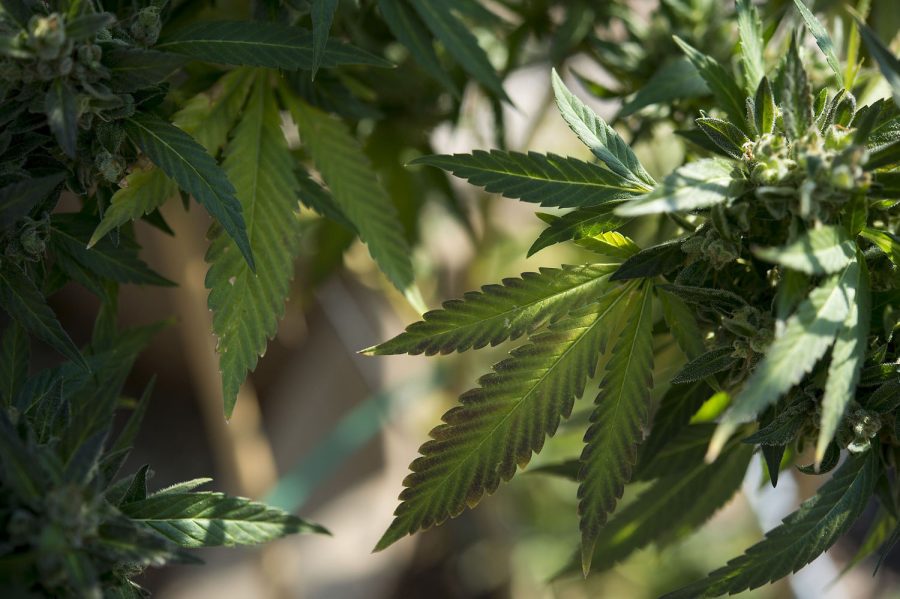Kent State students to face strict medical marijuana regulations
Marijuana grower Basil McMahon with his crop in Grass Valley, Calif., on November 12, 2015. A sweeping new package of laws will reverse years of state silence by regulating and licensing every stage of the medical marijuana industry. “It means I’ll be able to do what I’m doing without fear of persecution for the first time in my life, for the first time in generations,” McMahon said.
Although the state of Ohio is in the process of legalizing medical marijuana, usage on state college campuses will remain illegal, as the drug is prohibited under federal law.
The state of Ohio expects to have the use of medical marijuana in full operation in Sept. 2018, according to the Ohio Medical Marijuana Control Program, but these state laws will put Ohio college campuses in a bind.
Regarding drugs, college campuses follow federal law instead of state law. According to USA Today College, federal law supercedes state law because most colleges receive federal funding and promoting the use of federally illegal drugs can affect funding.
According to the Higher Education Center at The Ohio State University, marijuana remains a Schedule I drug under federal law. Federal law requires universities to enforce bans of illegal drugs on campus.
These laws will affect Kent State’s campus after laws regarding Ohio medical marijuana take action.
The composition of medical marijuana licensing, prescribing and usage rules for Ohio will be finished Sept. 8, 2017, the Ohio Board of Pharmacy noted.
“The deadline has been passed, and the rules are on track to be finished on time,” said Cameron McNamee, director of policy and communications at the Ohio Board of Pharmacy. “The program will become operational exactly one full year after the rules are finished, and we are confident that we will make this deadline and start the use of medical marijuana here in Ohio.”
Since rules are not been finalized, dispensary owner applicants have not been approved and neither have cultivator applicants. The Ohio Board of Pharmacy cannot say where dispensaries will be located.
“We have not approved any individuals to establish dispensaries, and the board of commerce is still working on approving cultivators,” McNamee said. “It also depends on the jurisdiction of that district or county. They can say no to dispensaries and override state law.”
Sixty applicants will be given license to establish dispensaries and 24 applicants will be licensed to cultivate medical marijuana after rules are adopted by the state regarding this law.
The state wants to make medical marijuana easily accessible to those with prescriptions, McNamee said.
“If the state feels as if more than 60 dispensaries need to be established, the board will approve more applicants, and the same for cultivators,” McNamee said.
After the state finalizes rules and gets the program in full operation, those with licenses will be able to purchase their prescriptions.
“Those with a prescription are able to possess the product for 90 days,” said Kerry Francis, communication director at the Ohio Department of Commerce. “They have freedom to purchase whenever they want and from wherever they want within the state.”
Although those with prescriptions will be able to purchase medical marijuana, not all college students on Kent State’s campus will be permitted to use their prescriptions, said Lieutenant Chris Jenkins of the Kent State Police Department.
Prescriptions do not permit use, Jenkins said, and a student must have a qualifying condition to use the type of marijuana product permitted by law.
Shay Little, president of student affairs, said the university will provide students with aid who need this prescription.
“We will accommodate a student depending on their needs,” Little said. “We will have to evaluate each student’s situation and make decisions and take action based on that.”
From a legal standpoint, Jenkins said students will be able to use their prescriptions if they meet conditions that are outlined in House Bill 523.
“The individual must make an affirmative defense, which shall include a qualifying condition, an authorized prescription and be using the type of marijuana products permitted by House Bill 523,” Jenkins said. “They will not be prevented from use if they meet conditions; The use would be legal.”
Holli Phillips is the health and wellness reporter. Contact her at [email protected].


